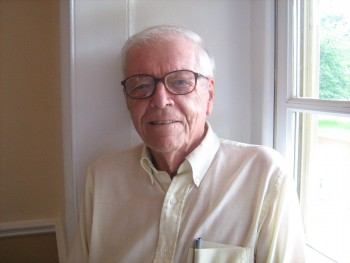Distinguished Alumnus and Former Professor Speaks at Reunion Weekend

John Cary '45
Details
The most memorable thing that has happened to me in the last 50 years took place in Berlin, Germany in 1996. There was a Haverford College connection.
Like the one you are celebrating today, this was a 50th anniversary. My wife and I had been among the American volunteers, Quaker and non-Quaker, who had worked with the American Friends Service Committee, the AFSC, the Quaker-run relief organization, in Germany after the Second World War. Now, 50 years after the end of the war, the German government wished to add to the world-wide public commemorations an occasion to express the gratitude of its people to the Service Committee and to its British equivalent, the Friends Service Council. It invited both organizations to send about 25 persons who had taken part in the work for a commemoration in Berlin.
My wife and I had worked in Munich in the U.S. Zone of Occupation, for the normal two-year stint of Service Committee volunteers. My wife worked with DPs, so-called displaced persons who had come to Germany as forced laborers during the war and now were anxiously awaiting visas for places like the U.S., Canada and Australia. I ran a student center at the University of Munich, meeting with students who wanted to broaden their horizons after 12 years of regimented thinking under Hitler.
At the end of our terms, in 1954, we came to Haverford. I had received a temporary appointment to replace my former teacher, Harry Pfund, while he in turn volunteered with the AFSC in Germany.
I stayed on at the College and retired in 1990. Then, in early 1996, my wife and I were in the group that flew to Berlin. Among us was Stephen G. Cary, class of 1937. Steve, of course, was a familiar figure on campus, as a devoted alum who served as vice-president and acting president of the College. He had come to the College administration from a career at the AFSC. Having served as AFSC commissioner overseeing the post-war relief work, he was one of us at the 50th anniversary event.
For us all, American and British volunteers, most of whom had not seen each other since the post-war days, it was a warm reunion. The site of our gathering seemed symbolic: Built in the 18th century as an armory for the kings of Prussia, it was now the Museum of German History, a place for enlightenment and understanding. The German government representatives took the occasion to recall personal memories of the help they had received as schoolchildren. They would have been about the same age as you members of the class of 1958. President Roman Herzog flew back early from a state visit to Paris to be with us. He spoke of the“Quäkersuppe” he had received at school. Another speaker had to admit that the“Quäkerkakau” left something to be desired as a drink. Our group got to sample this cocoa and had to agree that it was clearly more nutritious than it was tasty. But thousands of children were nourished, at a time when starvation and the general chaos in Europe had already prompted the U.S. government to create the Marshall Plan.
The German spokesmen were thanking us for what we had brought in material aid, limited as this effort was. But they had been equally grateful, they added, for our mere presence: as foreigners who had come to help in spite of what was becoming known at that time about the concentration camps. They realized that the world had not given up on them. And of course our hosts themselves were of that generation of schoolchildren, now grown up and leaders of a democratic Germany.
In closing, let me note that Haverfordians have been involved with the AFSC since its beginning. I have mentioned Steve Cary. But in the beginning there was Rufus M. Jones, class of 1885, who together with a few Friends“invented” the Service Committee in 1917, shortly after the U.S. entry into the First World War. There was a training unit on the campus for some of the hundreds of volunteers, including Haverfordians, who were involved in relief and reconstruction work behind the lines in France during and after the war.
Rufus Jones managed to carry the voluntary work of chair of the AFSC board for many years, along with his prolific scholarship and teaching duties. The same could be said of his successor in the chair, Henry J. Cadbury, Class of 1903, who taught at the College before going on to Bryn Mawr and Harvard. He would commute regularly to Philadelphia, noting with some glee that his train out of Boston bore the official name of“The Quaker via Hellgate.” Both of these“weighty” Friends had irrepressible wit and humor. Steve Cary was another.
You and I arrived at the College at the same time, in 1954, you as members of the class of 1958, I as a returning member of the class of 1945. It should be noted, finally, that the president of the College at that time, Gilbert White, had himself worked with the Service Committee during the war.



